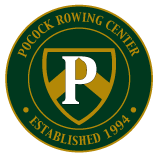The Pocock Family
Born in England in 1891, George Pocock learned the art of boat-building from his father, the boat builder at Eton College. He began sculling at the age of 12 and won his first race at 15.
In 1911, George and Dick Pocock relocated to British Columbia, where, after a series of odd jobs, they were commissioned to build two single shells for the Vancouver Rowing Club. In 1912, Hiram Conibear persuaded the two brothers to move to Seattle, to build boats for the University of Washington crew.
Soon their shells were making the Pocock name famous by winning races, and by the early 1920s orders were coming in from the major colleges where rowing was practiced.
Although Dick had moved on, George continued to operate the business and frequently acted as an unofficial assistant coach and advisor to the UW crew. The 1936 UW eight won Olympic gold in Berlin in a Pocock shell. When American crews in Pocock boats won again in 1948 and 1952, boat-builders began copying his designs and techniques.
George remained modest about his contributions, saying “There are no fast boats, only fast crews.”
Although plastics and composites began replacing wood in the 1960s, the Pocock boats remained the “gold standard.” By 1970, George had handed off most of the boat-building operation to his son Stan, although he maintained an active interest. At his death in Seattle in 1976, it could be fairly said that no other person had had a greater influence on American rowing.
From the Seattle Times:
"His influence turned Seattle into a center for rowing, and as UW rowers became coaches elsewhere, his shells – and his philosophy – spread. Through his leadership, rowing has become a sport for all ages as a singular or group activity. The blending of rowing and life – in his words: “Harmony, balance, rhythm. There you have it. That’s what life is all about.”
George Yeoman Pocock
Stanley Richard Pocock
Stan Pocock’s accomplishments in the rowing world abound.
Stan did more than just leave a path of amazing innovations and objects; he left an indelible mark on all the athletes he coached, the men and women he worked with, and the young athletes he inspired. To many, he was a mentor, a coach, a craftsman, and a legend. To us, he was a visionary and a philanthropist who gave everything he accomplished back to the rowing community.
Before he ended his boat-making career, Stan became one of the founders of the George Pocock Rowing Foundation and helped nurture it into existence. Ten years later after working hard to garner support and funding, he with several close friends, completed construction of the George Pocock Memorial Rowing Center.
It gave Stan great joy to see so many young people learn to row and thrive in the environment of the boathouse. The vision for the Pocock Rowing Center was blossoming as Stan lived and it shall live on. “Now, my earnest desire is that the quality of the eventual product of this center – the community-oriented rowing projects that we envision – will be known and celebrated for generations to come.”
In the final pages of his memoirs, Stan describes one of the most treasured rows of his career and in the same breath expresses his desire to pass on those amazing experiences: “I knew that I had just experienced something that might never happen again. I had lost myself and, in the process, had truly found myself. I had had a fleeting glimpse of the divine… I wanted people who rowed for me, at least once, to have the thrill of that one moment.”
Lucy Pocock was George and Dick Pocock’s older sister and a trailblazer in rowing.
She was the first in the family to excel in a rowing competition. In 1906 and 1907 when she was 19 and 20 years old, she won several Mixed Double Sculls events with H.N. “Blackie” Wakefield, and coxswain, Miss S. Goertz, at National Amateur Rowing Association (NARA) regattas open to tradesman and artisans. This included the Henley Town and Visitors’ Regatta both years and the Newman Challenge Cup for the Championship of the Thames at the Teddington Reach Regatta in 1906.
1912 turned out to be Lucy Pocock’s year. On August 24th, 1912, the graphic newspaper The Daily Mirror of London held "a Women’s Championship of the Thames . . . a unique opportunity for London’s women scullers to show that they can hold their own with the stronger sex in this finest of aquatic sports. Today’s great sculling match for women-only is a romantic revival of an old-time boat race, held on the Thames in 1833, for the wives and daughters of fishermen."
She won the event and became the Women’s Champion of the Thames before moving to Seattle the same year.
Upon arrival in Seattle, Washington, she served as a cook for the University of Washington men’s rowing team until she was hired to coach the UW women’s rowing and swimming team in 1913.
Thanks to the relentless promotion machine which was Hiram Conibear, much was made of Lucy’s appointment, with photos and newspaper articles across the United States and even in England.
Although Lucy Pocock only coached the women for a short time in the autumn of 1913, she was a wonderful role model and advocate and helped to reestablish the program at UW at a very critical time.
It is in her honor and memory that the George Pocock Rowing Foundation created Camp Lucy to remind young women they too can be trailblazers in rowing, and life.




